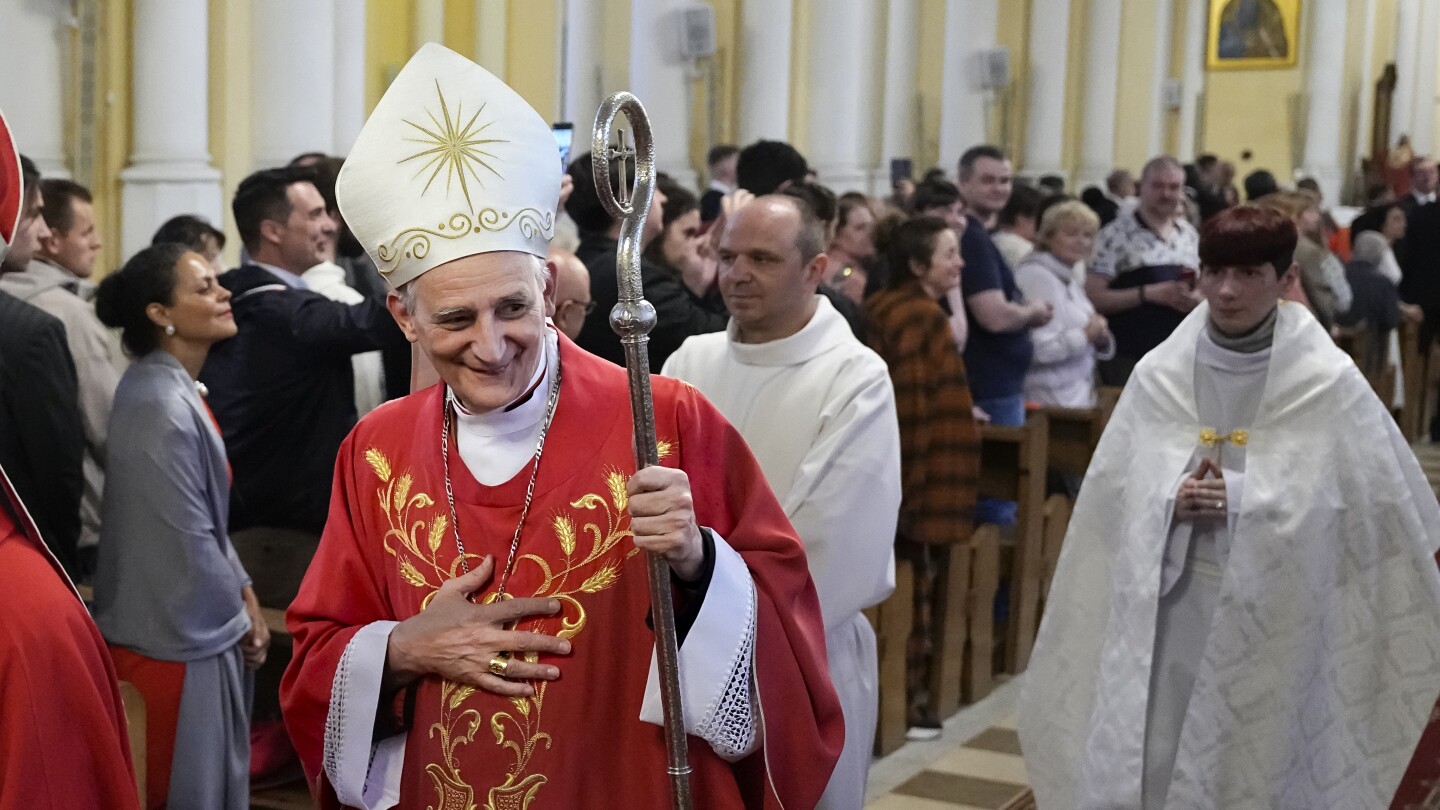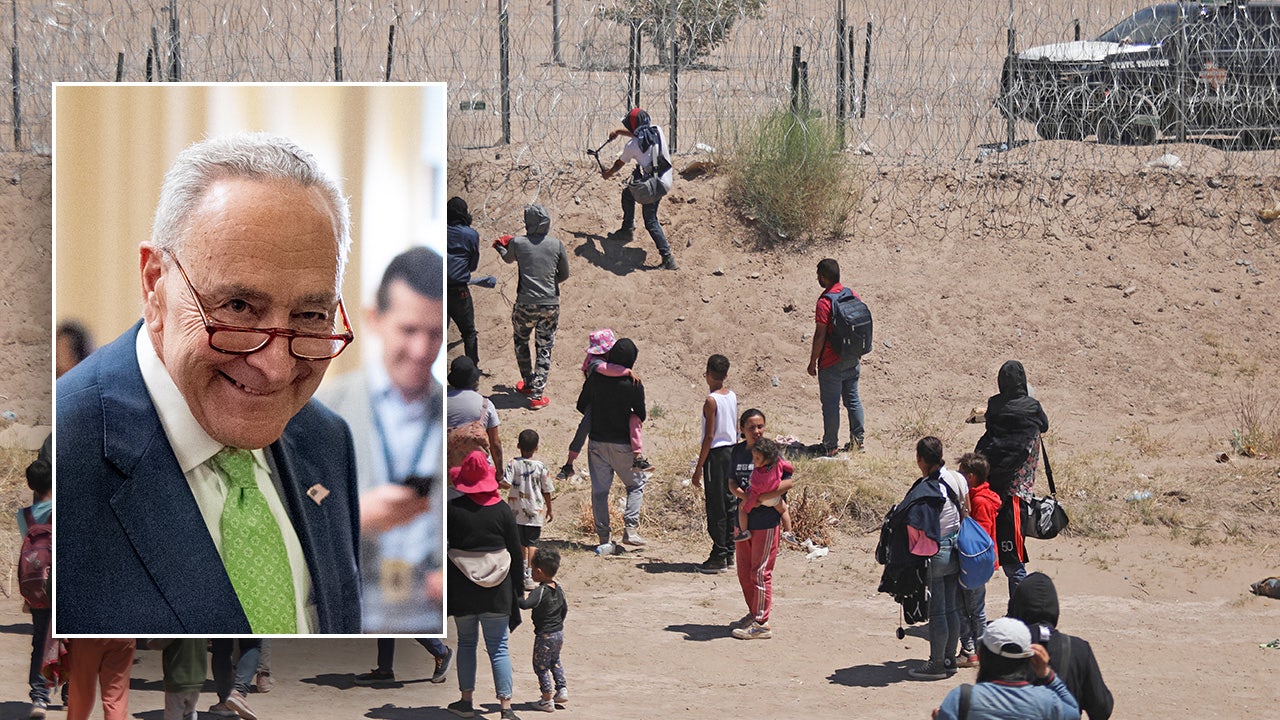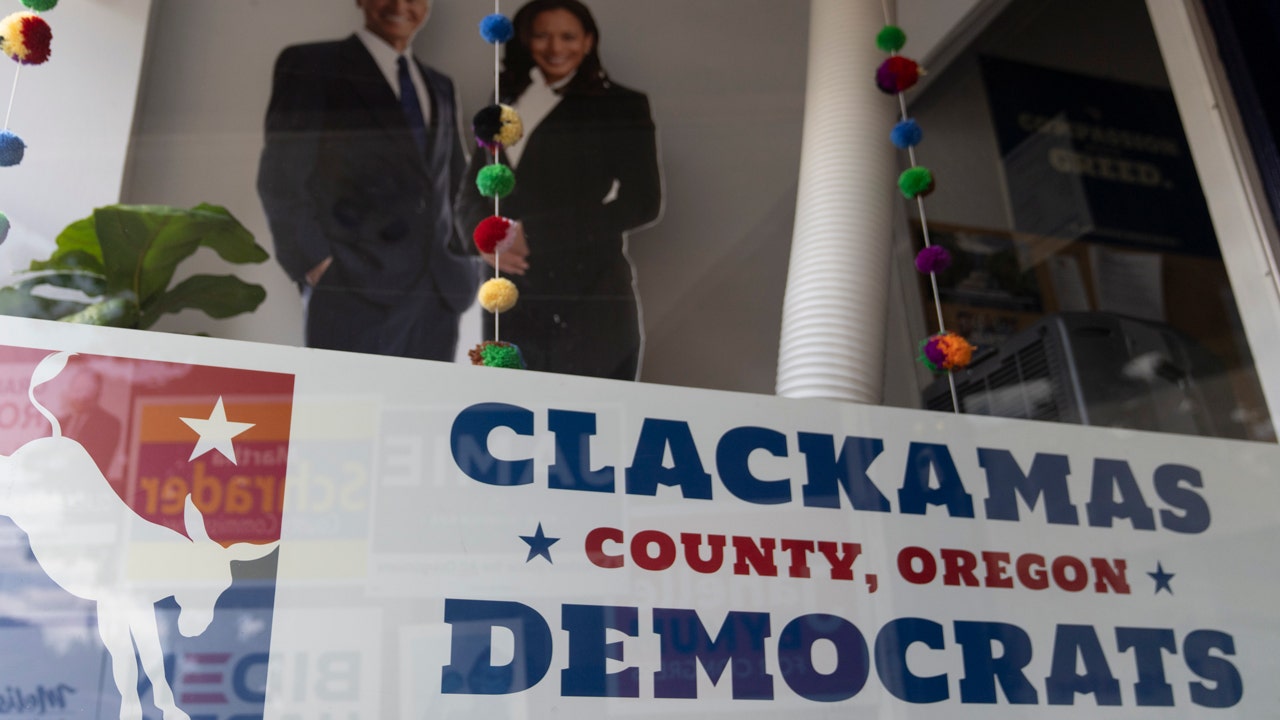Washington
The pope’s Ukraine peace envoy heads to Washington with the plight of children top of his agenda

ROME (AP) — Pope Francis’ peace envoy was traveling to Washington on Monday as part of the Holy See’s peace initiatives for Ukraine, hoping to support humanitarian operations especially concerning children, the Vatican said Monday.
Cardinal Matteo Zuppi’s visit, which lasts through Wednesday, follows his recent mission to Moscow and an earlier stop in Kyiv, where he met with President Volodymyr Zelenskyy.
Zuppi is a veteran of the Catholic Church’s peace initiatives and has been tasked by Francis to try to find “paths of peace” between the warring sides.
The Vatican is trying to tampe down the latest tempest over the 1983 disappearance of a Vatican employee’s teenage daughter.
Hong Kong’s newly named Roman Catholic cardinal says he hopes for reconciliation and wants the city to give young people more hope following the economic downturn and a campaign to crush a pro-democracy movement.
Pope Francis has announced he has chosen 21 new cardinals, including prelates from Jerusalem and Hong Kong, places where Catholics are a small minority.
Pope Francis has chosen a bishop from his Argentine homeland for one of the Vatican’s most powerful positions.
In Moscow, Zuppi met with Maria Lvova-Belova, Russia’s commissioner for children’s rights, as well as Patriarch Kirill, head of the Russian Orthodox Church, who has strongly supported the war.
Francis has taken up Ukraine’s request to intervene where possible to return Ukrainian children transported to Russia following Moscow’s invasion. The International Criminal Court has issued an arrest warrant for Lvova-Belova and Russian President Vladimir Putin, accusing them of abducting children from Ukraine. Russian officials have denied any forced adoptions, saying some Ukrainian children are in foster care.
Francis has said he hopes the Holy See can facilitate family reunifications, in the same way the Vatican stepped in to facilitate prisoner swaps.
In a statement Monday, the Vatican spokesman said Zuppi would travel to Washington with an official from the Vatican secretariat of state. There were no details on who he would see in the U.S. capital.
“The visit takes place in the context of the mission intended to promote peace in Ukraine and aims to exchange ideas and opinions on the tragic current situation and to support initiatives in the humanitarian sphere to alleviate the suffering of the most affected and fragile people, especially children,” the statement said.
Francis has repeatedly called for an end to the war but has refrained from outwardly criticizing Moscow, part of the Vatican’s tradition of maintaining diplomatic neutrality in conflicts in hopes that it can play a behind-the-scenes role in forging peace.
He has irked the U.S. and its allies by repeating Moscow’s argument that NATO was “barking at its gates,” and seemingly making a moral equivalence between Ukrainian and Russian losses.
He has asserted Ukraine’s right to self-defense but has sharply criticized the weapons industry, saying the provision of arms to Ukraine by the west could be immoral “if it’s done with the intention of provoking more war or selling weapons or getting rid of old ones.”

Washington
Adams slams Washington Post story on business leaders Gaza protest pressure as anti-Semitic

In the wake of a published Washington Post report claiming business leaders privately pushed Mayor Adams to crack down on pro-Palestinian college protests, the mayor Monday called the story “antisemitic” while not explicitly denying he met with the powerful execs.
“I think that article was antisemitic in its core,” Adams said on Fox5’s Good Day New York of the report from last week. “That some article is saying some clandestine group came together to pressure us, it’s a lie. It did not happen.”
While objecting to the story, the mayor did not address whether he held a private Zoom meeting on April 26 with the prominent business leaders, who reportedly pressed him to send police to disperse the protests at Columbia University. The meeting was not listed on the mayor’s public schedule.
The Post reported that during the call, participants discussed political donations to Adams and continued pressure on Columbia to summon the NYPD. The paper said it reviewed thousands of WhatsApp chat messages and verified the information with some members of the group.
“We meet with all groups throughout this city, of different breakdowns and ethnicities,” Adams said. “That is who I am, and I am going to continue to do so.”
Barry Williams for New York Daily News
NYPD officers stand post after other NYPD officers cleared pro-Palestinian protesters off the lawn of Columbia University Thursday April 18, 2024 in Manhattan, New York. (Barry Williams for New York Daily News)
The call purportedly was held after students at Columbia set up a new Gaza solidarity encampment after the NYPD dismantled the original tent city.
As the pro-Palestinian encampments spread at Columbia and other universities across the city, concerns about escalating antisemitic rhetoric and actions were growing. Columbia began offering online classes as some Jewish students felt unsafe going to campus, and Jewish campus leaders warned of a hostile environment.
On campus, college officials and student protesters advocating for divestment from Israel were in the midst of negotiations. The day after the call, Columbia President Minouche Shafik vowed not to call the NYPD again, claiming that police intervention would only inflame an already tense situation.
But a few days later, the calculus changed when a group of mostly students at Columbia and its affiliate institutions, such as Barnard College and Union Theological Seminary, took over a storied academic building for campus protests, Hamilton Hall. On April 30, Columbia officials summoned the NYPD to reclaim the building and clear the new tent demonstration.
In response to a Daily News inquiry, a rep for the Post said the paper regularly covers people with power and wealth working to influence public opinion and policy. They pointed to several other examples, including how a Catholic group spent millions on app data that tracked gay priests and conservative doctors influenced abortion and transgender rights.
Adams’ comments echoed Deputy Mayor Fabien Levy’s statement in the original article that “the insinuation that Jewish donors secretly plotted to influence government operations is an all too familiar antisemitic trope.”
The prominent business leaders and financiers had been communicating in a WhatsApp chat since mid-October titled “Israel Current Events,” according to The Post. Some chat participants attended private briefings with top Israeli officials including former Prime Minister Naftali Bennett and centrist war cabinet member Benny Gantz, while others helped screen footage of Hamas’ Oct. 7 atrocities in New York, the report said.
Getty
Hedge fund manager Bill Ackman. (Getty)
The group had reached about 100 members — including more than a dozen who appear on Forbes’s annual list of billionaires and prominent executives such as hedge fund manager Bill Ackman, a prominent critic of colleges’ responses to the Israel-Hamas war, and Joshua Kushner, founder of Thrive Capital and brother to Jared Kushner, former President Donald Trump’s son-in-law.
Members Kind snack company founder Daniel Lubetzky, hedge fund manager Daniel Loeb and billionaire Len Blavatnik reportedly participated in the April 26 call.
Matt Winkelmeyer/Getty Images
Hedge fund manager Daniel Loeb. (Photo by Matt Winkelmeyer/Getty Images)
Adams on Fox5 also reiterated that he only deployed NYPD on the Columbia and City College campuses after the schools’ leaders asked for police assistance. Since the raids, Adams and top NYPD brass have alleged the student protesters were goaded by “outside agitators” with no ties to the local colleges.
“We waited, as we were supposed to, to get calls from the college presidents to tell us when to come in,” he said.
Getty
Joshua Kushner, founder of Thrive Capital and brother to Jared Kushner. (Getty)
The Columbia chapter of Students for Justice in Palestine, which helped organize many of the demonstrations on campus, said in a statement on social media that members of the group were “the real outside agitators,” who have no affiliation with Columbia but encouraged the NYPD be used on protesters.
With Chris Sommerfeldt
Washington
Maps show where Iranian President Ebrahim Raisi’s helicopter was found

Rescue teams struggled to reach the area where the helicopter was believed to have landed amid poor visibility, state media said.
During a television broadcast, an International Red Cross and Red Crescent official described the active search area, 55 miles north of the provincial capital of Tabriz, as roughly 20 to 30 square miles in mountainous terrain.
Washington
Washington takes aim at Spartina, spongy moth

Washington’s State Department of Agriculture is ramping up treatments against two invasive species – the spongy moth and the aggressive Spartina weed.
Spongy moth
A low-flying airplane began treatments to eradicate spongy moth caterpillars on May 10, with plans to aerially treat about 1400 acres in Thurston County and 900 acres in Skagit County with a naturally occurring soil bacteria, Btk (Bacillus thuringiensis var. kurstaki). Because the Skagit County site is in a cooler climate, treatments were anticipated to start there mid- to late-May.
The sites will each be treated three times, with applications approximately 3 – 10 days apart. All treatments are weather dependent and the schedule is subject to change. WSDA expects to complete all applications by early June.
Because weather conditions heavily influence when treatments occur, WSDA advises people in or near the treatment areas to visit agr.wa.gov/moths to sign up for e-mail, text or robo-call alerts that are issued the day before applications are scheduled to take place. Changes in scheduled treatments will also be shared through these notification systems. WSDA also mailed multiple postcards to residents in and near the treatment areas advising them of the upcoming treatments. The public can enter an address in a map on the agency website to determine whether their residence is within or near the treatment area.
According to the Washington State Department of Health, Btk poses very low risk to humans, pets, birds, fish and bees. Btk is found naturally in the environment and has an excellent safety record while also being effective for spongy moth eradication. Although the risk to humans is low, as a precaution, DOH recommends that people who wish to minimize their exposure to the spray remain indoors with doors and windows closed during spraying and for 30 minutes afterward. Let the spray dry before allowing children to play outside, wash with soap and water if you do have skin contact with the spray, and rinse your eyes with water if eye contact occurs.
Btk is sticky. Residents in the treatment areas may choose to cover cars parked outside and bring in toys, etc. to protect them from the spray. However, Btk can be cleaned off outdoor articles with soap and water.
This is the 50th year of the spongy moth program at WSDA. It has been one of the most successful pest detection and eradication programs in the country, preventing spongy moths from establishing in the state and protecting our environment, communities and agriculture from this destructive, invasive pest. The program has trapped for spongy moths (known as gypsy moths when the program started) since 1974 and conducted the first eradication program in 1979. The WSDA Pest Program has safely eradicated every spongy moth population attempting to establish in the state since the program began.
Spongy moths pose a serious threat to Washington’s environment, with the caterpillars feeding on over 300 types of trees, plants and shrubs. The pest is permanently established in 20 states across the Northeast and Midwest, where it has defoliated millions of acres of forest and urban trees. In 2017, spongy moth caterpillars defoliated one-third of the entire state of Massachusetts and in 2018, they lost about one-quarter of their hardwood trees, including three-quarters of their oak trees, in large part due to spongy moth infestations.
If spongy moth were to become established in Washington, it would threaten forest ecosystems, defoliate or kill trees and shrubs in backyards and parks, lead to quarantine restrictions on forest products and horticulture, and result in long-term increased homeowner pesticide use.
Visit the agency’s spongy moth web page at agr.wa.gov/moths to learn more or contact the WSDA Pest Program at [email protected] or 1-800-443-6684.
Spartina
This year’s treatment season for Spartina, an aggressive invasive weed, starts June 1 and will continue through November.
Eradication efforts will take place in multiple areas, including Grays Harbor, Hood Canal, Willapa Bay, Puget Sound, the north and west sides of the Olympic Peninsula and near the mouth of the Columbia River.
This year’s efforts build on the work completed last season when thorough surveys detected recently established Spartina within restored wetlands in the North Puget Sound. The project partners will work to stop the trend of Spartina spreading into and impacting important restoration projects. Since 1995, WSDA has served as the lead state agency for Spartina eradication, facilitating the cooperation of local, state, federal and tribal governments; universities; interested groups; and private landowners. The cooperative effort located and treated over 17,000 individual Spartina plants last year.
The Spartina eradication effort has been highly effective – reducing infestations from a high of more than 9,000 solid acres in 2003 to just over four total acres in 2023.
The effort has successfully eradicated Spartina at 75 sites, however significant work remains to be done. The four remaining acres are spread over 126 sites – meaning 62 percent of Washington’s known infestations are not yet eradicated.
“Our goal is to eradicate Washington’s remaining Spartina infestations, protecting important habitat for salmon, waterfowl and shellfish,” said Chad Phillips, WSDA’s Spartina Program Coordinator. “The Spartina Eradication Program protects our state’s most productive estuaries and shoreline habitats. This year, with our project cooperators, we will continue the challenging work of finding and removing the thousands of Spartina plants that remain in the Puget Sound and along Washington’s coast.”
This season, project partners will survey thousands of acres of saltwater estuaries and hundreds of miles of shoreline. WSDA and its partners typically dig out small infestations by hand and utilize herbicides at larger sites.
Spartina, commonly known as cordgrass, can disrupt the ecosystems of native saltwater estuaries. If left unchecked, Spartina outcompetes native vegetation and converts ecologically healthy mudflats and estuaries into solid Spartina meadows. As a result, important habitat for salmon, forage fish, invertebrates, shorebirds and waterfowl are lost, the threat of flooding is increased, and the state’s shellfish industry is negatively impacted.
Visit agr.wa.gov to for more information on Spartina control efforts.
Source: Washington State Department of Agriculture
-

 News1 week ago
News1 week agoSkeletal remains found almost 40 years ago identified as woman who disappeared in 1968
-

 World1 week ago
World1 week agoIndia Lok Sabha election 2024 Phase 4: Who votes and what’s at stake?
-

 Movie Reviews1 week ago
Movie Reviews1 week ago“Kingdom of the Planet of the Apes”: Disney's New Kingdom is Far From Magical (Movie Review)
-

 World1 week ago
World1 week agoUkraine’s military chief admits ‘difficult situation’ in Kharkiv region
-

 World1 week ago
World1 week agoBorrell: Spain, Ireland and others could recognise Palestine on 21 May
-

 Politics1 week ago
Politics1 week agoTales from the trail: The blue states Trump eyes to turn red in November
-

 World1 week ago
World1 week agoCatalans vote in crucial regional election for the separatist movement
-

 Politics1 week ago
Politics1 week agoNorth Dakota gov, former presidential candidate Doug Burgum front and center at Trump New Jersey rally


















